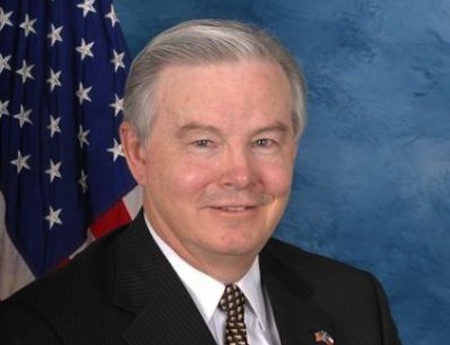Barton: LPTV Bill Is 'Just Right'

The smarter way to stay on top of broadcasting and cable industry. Sign up below
You are now subscribed
Your newsletter sign-up was successful
There is no unity in the LPTV community. That is how one witness put it at a Hill hearing in the House Communications Subcommittee Thursday. Subcommittee chairman Greg Walden (R-Ore.) agreed, but said that a bill currently before the committee is needed to make sure the FCC does not "squash" LPTVs "just because it can."
One of the subjects of the legislative hearing was a bill, The LPTV and Translator Preservation Act of 2014, introduced by Rep. Joe Barton (pictured) (R-Texas). The bill, say its backers, is intended to insure that the FCC takes into account the value of low-power TV stations, TV station translators and boosters when it repacks stations after the broadband incentive auctions.
The bill does not change those stations' secondary status—the FCC can force them to go dark if not to do so would adversely affect repacking—which is why some LPTV supporters don't support the bill.
But it would require the FCC to take that value into account when deciding the fate of those stations, which other avowed LPTV supporters say could jeopardize the auction repacking for not much upside given that it does not change their regulatory status.
Louis Libin, executive VP of LPTV group the Advanced Television Broadcasting Alliance, said the bill was at least an effort to prevent the FCC from indiscriminately pulling LPTV license as part of the auction. He called it a step in the right direction.
Harold Feld of Public Knowledge, which generally supports LPTVs, said that he was concerned the bill would cause unneeded confusion that could disrupt repacking and delay the incentive auction—now scheduled for mid-2015. He told the legislators that the FCC needs to begin building real-time auction software on a stable foundation and that the LPTV bill could jeopardize that.
Barton said he thought the bill struck the right balance, and likened it to the just-right bowl of porridge in Goldilocks and the Three Bears. Barton said it does raise LPTVs "moral standing" in petitions at the FCC, but is hardly a threat to the auctions.
The smarter way to stay on top of broadcasting and cable industry. Sign up below
Rep. Walden challenged Feld on his dire predictions, saying that it was "over the top" to suggest the bill could blow up the auction. Walden, a former broadcaster, also expressed his continuing unhappiness with FCC processes, saying he did not have the confidence of some that the FCC would be taking LPTVs sufficiently into account, adding that the bill was needed to make sure the commission didn't squash LPTVs just because it could to benefit the big companies that want wireless spectrum.
He said the bill was needed to send a clear message to the FCC that it needs to be thoughtful about LPTVs and repacking.
The legislators seemed in agreement that LPTVs provided a valuable service in rural communities and to minority populations in urban ones, which is why they backed signaling to the FCC their interest in preserving those stations where possible.
Putting an exclamation point on the disunity in the community is the LPTV Spectrum Rights Coalition. While not represented at the hearing, it has called the bill "an attempt by the biggest broadcasters and wireless companies to destroy the future of LPTV."
Also being considered in the hearing was the E-LABELING Act.
Rep. Bob Latta (R-Ohio) talked briefly about the act, which would put the FCC on a timetable for a rulemaking allowing onscreen and online labeling of consumer electronics with integrated video screens (computers, smart phones, TVs). Up until a couple of weeks ago those devices had to have physical labels, which can be expensive and increasingly difficult to execute on increasingly smaller devices. But the FCC released guidance saying they could opt to use on-screen and online labeling. That would appear to moot the bill, though its backers at the hearing only called the FCC guidance a good first step and suggested the legislation was still needed.
Contributing editor John Eggerton has been an editor and/or writer on media regulation, legislation and policy for over four decades, including covering the FCC, FTC, Congress, the major media trade associations, and the federal courts. In addition to Multichannel News and Broadcasting + Cable, his work has appeared in Radio World, TV Technology, TV Fax, This Week in Consumer Electronics, Variety and the Encyclopedia Britannica.

